Volunteer Preparation to Kenya
We will make sure that any volunteers or school groups or university groups are properly prepared before they go abroad, by experienced people who represent the charity and who have spent many years in-country working with the local NGOs. These people are friendly, communicative and helpful, and they will ensure that every visitor gets the required amount of support prior to going and when they come back. We do have criteria for volunteers, including a DBS security check, and we require all volunteers to be vetted and trained before having any contact with children.
Further training is done on arrival by the local staff who will ensure that you are ready to move into the guesthouses and start on the programme or project that has been chosen. This may take some days, and some training will have to be signed off by you. For example, we are particular about personal health and ensuring that you take the anti-malarial tablets since we have experience of people in the past forgetting to take their tablets or not wanting to. Therefore all our staff are asked to follow up on this, and there is a chart on the wall in the guesthouse which you can fill in to make sure that this regime is followed.
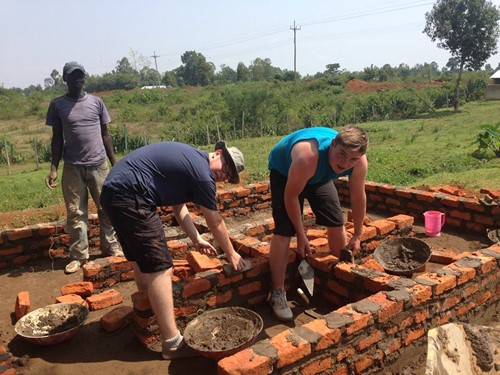
Working together to connect communities and people on a global level.
You may also be asked to get in touch with the in-country staff online through facebook and skype in the months before going. They will want to get to know you in advance and ask you questions about your life, as much as you will want to chat with them.
During the pre-trip training we look at the following issues and we have to 'sign you off' as having taken part. Some of this can be done online and in your own time, while some of it really has to be taught and experienced to make it worthwhile.
Project Descriptions
We will go through all the background of the projects and discuss your involvement. We can also Skype the programme managers so you can chat to them yourselves about what you will be doing.
First Aid
This is not a certified course but we will expect you to know how to handle minor injuries, personal hygiene and health issues specific to travelling such as managing antimalarials in east Africa. You also have access to a dedicated team of travel health experts at Interhealth, who can also carry out psychological counselling.
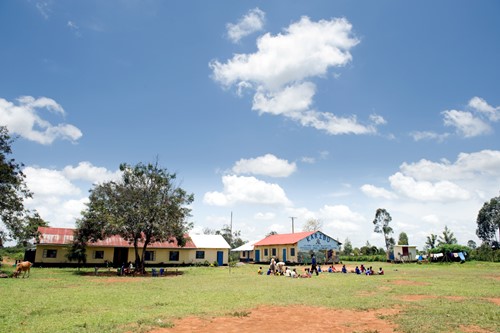
Hanging out at our Ulamba Guest House, playing some games with local children and enjoying some cultural exchange.
Culture and Language
This will be dealt with more thoroughly on the ground with the local staff, but we will discuss some issues of etiquette and especially your approach to material poverty and how you will deal with it. We would also expect you to start learning some Swahili and continue while in Kenya. For more information, see our Kenya Cultural Page.
Personnel Management
A good team member is someone who can work to a routine, have some discipline and look after him or herself in the outdoors or on the move. This is an important part of the training to make sure you can concentrate on the projects rather than worrying about yourself. We don't want people who stay in bed all morning or cannot turn up to meetings on time.
Teamwork and Leadership
This is developing the last aspect of personnel management, and we will discuss the characteristics needed for being a good team player. This is the sort of education you can't get in school but will prove invaluable in preparing for everything from job interviews to public speaking.
Blogging and Videos
We will be asking that every person keeps a blog throughout their trip. Part of your job will be to teach the local youngsters about social media and helping them understand that global reach. Looking for some inspiration? Check out our YouTube Channel.
Development Ideas
This is a really important aspect of your training and involves understanding what international development is all about. We will get some experts along to talk to you about what a gap year can achieve in the world of development and how our approach to aid has changed over the years. You will also be expected to do some homework on this and we'd also like you to try and get a Development Mentor in the industry to work with you personally on your own journey into this very complex and topical subject.
Personal interest
While you are working as a team, we will also expect every one of you to have one (or more) personal interests which you can work on during the run-up of the trip, the trip itself and hopefully afterwards. For example, you might want to study the environmental impact of tourism, or photography, or wildlife, or any of a long list of possibilities. It's an open field but we would like you to use this trip as a way of achieving something personal to you. If you want, we can help you publish it online.
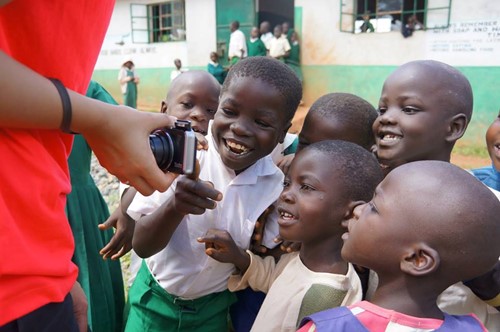
Work on your skills and engage with locals to create a lasting connection to the spaces you work in.
Fundraising for Volunteering in Kenya
This is probably going to be the biggest worry for you since the trip does cost money, but in itself, it is a huge subject and there are lots of opportunities out there which you may not know about. We will show you how to search for it, and also help you with answering some of the questions if you are applying for a grant. We will also talk about what you can reasonably fundraise for, and what you should find yourself from working or from family support.
Millennium Development Goals & Human Rights
Nowadays most developed countries have signed up to the 'MDG' aim, and you need to be aware of what they are and how this gap trip fits into the worldwide aim of bringing them to fruition. Adventure Alternative also signs up to all the major declarations concerning human rights, rights of indigenous peoples and responsible tourism; we would like you to understand what they all are, what they mean and your role in upholding them.
Social Impact Questionnaire
We will be asking that during your trip abroad you help carry out a continued social impact questionnaire in every area of the trip that you think relevant. This includes land issues, employment, environment and much more.
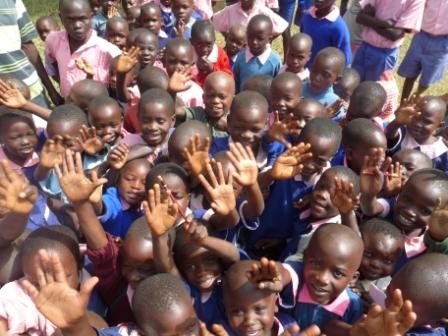
Together we can all make a difference and create a happier world.
Building Techniques
During your trip, you will be doing some construction or refurbishment work and we will provide training for you in how to use the tools and equipment. Some of it is quite unusual since in Moving Mountains we specifically promote techniques for unskilled labour. During your trip, you will get first-hand training, but beforehand we will help you understand what it all means.
Camping in Kenya
Some of the trips will be in tents so we will also look at principles of camping and make things safe. This will also be supplemented by training on the ground with the indigenous tribes who have lived in the rainforests for generations and provide a wealth of knowledge.
Homesickness and Home
You may not think it will happen but you would be very unusual if you never got homesick at least once during your trip. We'll talk about this a lot and discuss ways of dealing with it, and also make sure you don't worry your family too much! Being homesick, having bad days, feeling a bit sick, having arguments, getting emotional and getting annoyed with other people on the trip - these are all to be expected, but the better we discuss it first, the better you'll be ready for it.
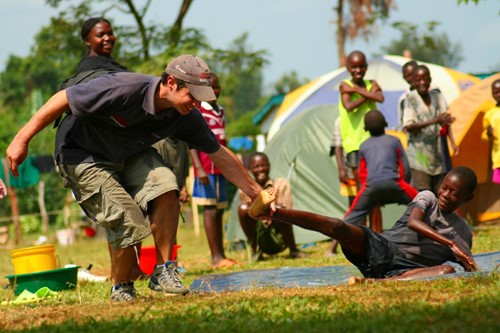
Playing games with the kids of the community. All smiles here.
Volunteer Support
Through our experience of providing development trips over the years, we have come to identify the benefits of providing a degree of support and follow-up to our volunteer clients when they return home. Aside from the social side of the home-coming experience, there is also the personal development aspect of the trip. It is important that you recognise the huge gains that can be made from your experiences and how they may help guide the next stages of your life. We believe that one of the strongest ways to get the most from your experience is to record them, actively reflect on them and then build directly upon them. We will provide a framework of support to help you to achieve this.
Activities and initiatives include:-
- We encourage all members to keep a journal of their trip, however brief or in-depth. We then ask that they produce a short report on the trip or specific aspect of it, to be shared with their fellow travellers.
- We organise a de-briefing stage for the trip on return to the UK.
- We provide a forum which group members can stay in touch with the rest of the group and with the communities that they visited abroad.
- We provide a workshop on careers, interview techniques, employability and International Citizenship.
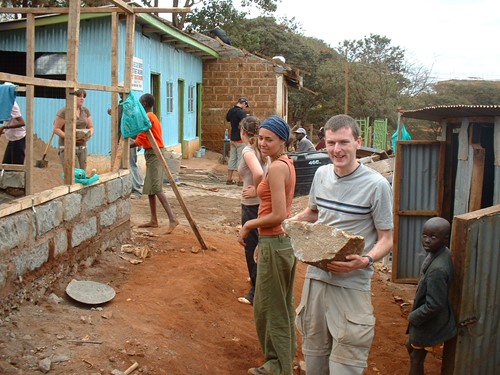
Build something physical and tangible, build community and make a change in the world.
We also provide continual support on the ground during the trip, from both the local staff and also the UK staff and Trustees. Generally, this follows a process of keeping in touch by phone, text or WhatsApp, email and Skype. Volunteers have contact with us all the time and there is plenty of opportunities for us to be flexible. We have a very large network of people on the ground so volunteers find they have plenty of people to socialise and discuss issues with. Each area has a high level of staff input and there are always activities going on.
Volunteers generally become immersed in a way of life and make lots of new friends, as well as contributing meaningfully to the work of the charity. If there are any problems, we can quickly respond to emergencies and information is very easily conveyed to the office in the UK and also to friends and family back home. Most Kenyans use wifi now to communicate with WhatsApp or VoIP technology, and most people use smartphones to get online. We provide logistical and practical support, as well as emotional back up when it is needed.

